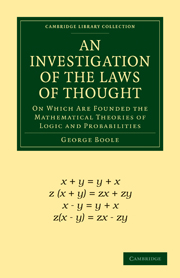 An Investigation of the Laws of Thought
An Investigation of the Laws of Thought Book contents
- Frontmatter
- PREFACE
- Contents
- CHAPTER I NATURE AND DESIGN OF THIS WORK
- CHAPTER II SIGNS AND THEIR LAWS
- CHAPTER III DERIVATION OF THE LAWS
- CHAPTER IV DIVISION OF PROPOSITIONS
- CHAPTER V PRINCIPLES OF SYMBOLICAL REASONING
- CHAPTER VI OF INTERPRETATION
- CHAPTER VII OF ELIMINATION
- CHAPTER VIII OF REDUCTION
- CHAPTER IX METHODS OF ABBREVIATION
- CHAPTER X CONDITIONS OF A PERFECT METHOD
- CHAPTER XI OF SECONDARY PROPOSITIONS
- CHAPTER XII METHODS IN SECONDARY PROPOSITIONS
- CHAPTER XIII CLARKE AND SPINOZA
- CHAPTER XIV EXAMPLE OF ANALYSIS
- CHAPTER XV OF THE ARISTOTELIAN LOGIC
- CHAPTER XVI OF THE THEORY OF PROBABILITIES
- CHAPTER XVII GENERAL METHOD IN PROBABILITIES
- CHAPTER XVIII ELEMENTARY ILLUSTRATIONS
- CHAPTER XIX OF STATISTICAL CONDITIONS
- CHAPTER XX PROBLEMS ON CAUSES
- CHAPTER XXI PROBABILITY OF JUDGMENTS
- CHAPTER XXII CONSTITUTION OF THE INTELLECT
- ERRATA
CHAPTER XVI - OF THE THEORY OF PROBABILITIES
Published online by Cambridge University Press: 05 November 2011
- Frontmatter
- PREFACE
- Contents
- CHAPTER I NATURE AND DESIGN OF THIS WORK
- CHAPTER II SIGNS AND THEIR LAWS
- CHAPTER III DERIVATION OF THE LAWS
- CHAPTER IV DIVISION OF PROPOSITIONS
- CHAPTER V PRINCIPLES OF SYMBOLICAL REASONING
- CHAPTER VI OF INTERPRETATION
- CHAPTER VII OF ELIMINATION
- CHAPTER VIII OF REDUCTION
- CHAPTER IX METHODS OF ABBREVIATION
- CHAPTER X CONDITIONS OF A PERFECT METHOD
- CHAPTER XI OF SECONDARY PROPOSITIONS
- CHAPTER XII METHODS IN SECONDARY PROPOSITIONS
- CHAPTER XIII CLARKE AND SPINOZA
- CHAPTER XIV EXAMPLE OF ANALYSIS
- CHAPTER XV OF THE ARISTOTELIAN LOGIC
- CHAPTER XVI OF THE THEORY OF PROBABILITIES
- CHAPTER XVII GENERAL METHOD IN PROBABILITIES
- CHAPTER XVIII ELEMENTARY ILLUSTRATIONS
- CHAPTER XIX OF STATISTICAL CONDITIONS
- CHAPTER XX PROBLEMS ON CAUSES
- CHAPTER XXI PROBABILITY OF JUDGMENTS
- CHAPTER XXII CONSTITUTION OF THE INTELLECT
- ERRATA
Summary
ON THE THEORY OF PROBABILITIES.
Before the expiration of another year just two centuries will have rolled away since Pascal solved the first known question in the theory of Probabilities, and laid, in its solution, the foundations of a science possessing no common share of the attraction which belongs to the more abstract of mathematical speculations. The problem which the Chevalier de Méré, a reputed gamester, proposed to the recluse of Port Royal (not yet withdrawn from the interests of science by the more distracting contemplation of the “greatness and the misery of man”), was the first of a long series of problems, destined to call into existence new methods in mathematical analysis, and to render valuable service in the practical concerns of life. Nor does the interest of the subject centre merely in its mathematical connexion, or its associations of utility. The attention is repaid which is devoted to the theory of Probabilities as an independent object of speculation,—to the fundamental modes in which it has been conceived,—to the great secondary principles which, as in the contemporaneous science of Mechanics, have gradually been annexed to it,—and, lastly, to the estimate of the measure of perfection which has been actually attained. I speak here of that perfection which consists in unity of conception and harmony of processes. Some of these points it is designed very briefly to consider in the present chapter.
- Type
- Chapter
- Information
- An Investigation of the Laws of ThoughtOn Which Are Founded the Mathematical Theories of Logic and Probabilities, pp. 243 - 252Publisher: Cambridge University PressPrint publication year: 2009First published in: 1854


